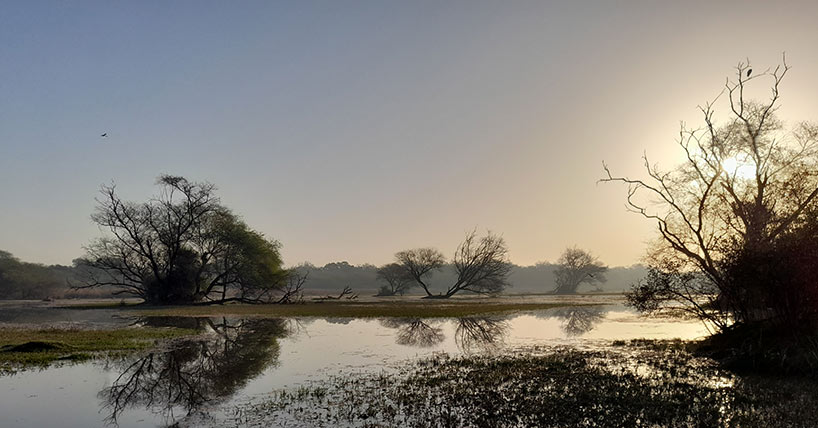New report on state of conservation at World Heritage Site in India
Conservation experts have provided vital recommendations to help protect a globally significant UNESCO World Heritage Site in India.
2 October 2023
Conservation experts have provided vital recommendations to help protect a globally significant UNESCO World Heritage Site in India.
Professor Philip McGowan was part of an International Union for Conservation of Nature (IUCN) monitoring mission to review the state of conservation of Keoladeo National Park and provide recommendations to address pressing issues. IUCN is the official advisor on nature to the UNESCO World Heritage Committee.
Keoladeo National Park (KNP), spanning 2,873 hectares, was inscribed on the World Heritage List in 1985 for its global significance as a habitat for rare and endangered species and a wintering ground for the highly threatened Siberian crane.
The park has long been known for its waterbird assemblages, large numbers of both resident breeding species and overwintering migratory ducks, geese and waders. It was formerly a duck hunting reserve of the Maharaja of Bharatpur and hosted many shooting days where large numbers of ducks were ‘bagged’. Hunting has long been banned and KNP is now known globally for its diverse flora and fauna, especially the variety of bird species and is recognized for its outstanding ecological value and as a critical habitat for migratory waterfowl.
However, KNP faces significant conservation challenges, most notably securing its water supply, as this originates outside the park, and the spread of invasive species. The World Heritage Committee requested the Government of India invite IUCN to undertake a monitoring mission to assess the state of conservation in the park, and in particular evaluate these two issues, but also to explore issues such as monitoring of birds and management planning.
Mission recommendations
The report indicates that whilst there is progress in some areas, challenges remain significant, especially securing a long-term water supply. The State Party of India has continued its efforts to control invasive species but it also remains a challenge, especially the management of Prosopis juliflora, a small tree native to the Americas that was introduced to India about 150 years ago. The species is now present in many parts of the park and, alongside the challenge in obtaining sufficient water, is having an effect on the wetland ecosystem and bird populations, necessitating an urgent adaptive management strategy.
The World Heritage Convention states the global importance of the park as its ‘Outstanding Universal Value’, and whilst the conservation and ecological importance of KNP is clear, there is a need to define the specific ecological features that make up the Outstanding Universal Value so that it can be monitored and protected. Such ‘attributes’ may include numbers of species breeding or overwintering, numbers of threatened species or the numbers of key species as well as the extent and diversity of the wetland.
Following the monitoring mission in February 2023, the IUCN report was published by UNESCO on the World Heritage Convention website. All World Heritage Sites are subject to periodic State of Conservation reporting at World Heritage Committee meetings and the IUCN mission report informed the State of Conservation report for KNP at the extended 45th session of the World Heritage Committee meeting, held in Saudi Arabia between 10 and 25 September 2023. The Committee requested the State Party to implement the 2023 mission recommendations, including to:
- Develop a clear list of attributes that convey the Outstanding Universal Value (OUV) to inform the long-term monitoring, protection and management of the park,
- Secure a long-term strategic solution to water supply,
- Ensure the current status of the Siberian Crane is accurately reflected in the monitoring and management,
- Establish a scientifically-based monitoring programme based on the attributes that convey the OUV to inform management of the park,
- Establish a long-term adaptive management strategy for invasive species,
- Review the 2017-2027 Management Plan with an explicit focus on the management of the OUV of the World Heritage Site, and
- Ensure management planning and decision-making is focused specifically on the OUV of the World Heritage Site.
Professor Philip McGowan, Professor of Conservation Science and Policy, Newcastle University School of Natural and Environmental Sciences and Chair of the IUCN Species Survival Commission Post-2020 Biodiversity Targets Task Force, said: “Keoladeo is an amazing wetland in an intensively managed landscape that is of global importance for its biodiversity. for the richness and diversity of its breeding and overwintering waterbirds is exceptional. As demand for water in the region intensifies because of many demands and because of variable rainfall over the last decade, including failed monsoons, there is a real challenge ahead in maintaining an adequate water supply to sustain the wetland ecosystem. Addressing this is central to securing the future of the amazingly rich and diverse biodiversity of the park.”
